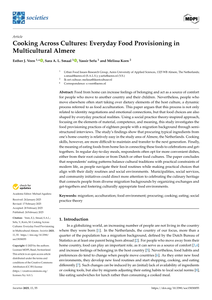The topic of this paper is the constructivism-realism debate, construed as an example of the intrusion of philosophy into science. Against this intrusion I maintain that philosophical problems are not only different from scientific and practical ones. They are also problematic in themselves. That is why their import into our scientific and practical work only creates confusions that hinder us in our work. The aim of the paper is to show that the philosophical problems that create those confusions need a Wittgensteinian therapeutic treatment. The method of the paper consists in comparing what philosophers (or philosophising scientists) say we do with what we actually do. After giving an example of what happens when a rightly respected scientist starts philosophizing, the method is applied, first, to the relation between language and the world and, second, to the relation between theories and the world. In the first application a story about three umpires is used to distinguish language and discourse, between questions of meaning (of the words we use) and questions of truth (of the things we say). In the second application a comparison between maps and theories is used to show the difference between assessing the truth of descriptive statements and explanatory theories. The examples of the umpires and maps are introduced by Weick and in both cases I show that neither constructivist nor metaphysical realist conclusions follow.
DOCUMENT

How to conceptualize online sociability in the 21st century? To answer this question, Communities at a Crossroads looks back at the mid-2000s. With the burst of the creative-entrepreneur alliance, the territorialisation of the internet and the commercialization of interpersonal ties, that period constituted a turning point for digital communitarian cultures. Many of the techno-libertarian culture’s utopias underpinning the ideas for online sociability faced systematic counter evidence. This change in paradigm has still consequences today.Avoiding both empty invocations of community and swift conclusions of doom, Annalisa Pelizza investigates the theories of actions that have underpinned the development of techno-social digital assemblages after the ‘golden age’ of online communities. Communities at a Crossroads draws upon the analysis of Ars Electronica’s Digital Communities archive, which is the largest of its kind worldwide, and in doing so presents a multi-faceted picture of internet sociability between the two centuries.Privileging an anti-essentialist, performative approach over sociological understandings of online communities, Communities at a Crossroads proposes a radical epistemological turn. It argues that in order to conceptualize contemporary online sociability, we need first to abandon the techno-libertarian communalist rhetoric. Then, it is necessary to move beyond the foundational distinction between Gemeinschaft and Gesellschaft, and adopt a material semiotic approach. In the end, we might have to relinquish the effort to define online or digital communities and engage in more meaningful mapping exercises.
MULTIFILE
Food from home can increase feelings of belonging and act as a source of comfortfor people who move to another country and their children. Nevertheless, people whomove elsewhere often start taking over dietary elements of the host culture, a dynamicprocess referred to as food acculturation. This paper argues that this process is not only related to identity negotiations and emotional connections, but that food choices are also shaped by everyday practical realities. Using a social practice theory-inspired approach, focusing on the elements of material, competence, and meaning, this study investigates the food provisioning practices of eighteen people with a migration background through semistructured interviews.Keywords: migration; acculturation; food environment; procuring; cooking; eating; social practice theory
MULTIFILE

Een boek over de methodologie van praktijkgericht fundamenteel en toegepastonderzoek. Het boek is geschreven door dr. Jac Christis, ter gelegenheid van zijn afscheid als lector ‘Organisatieontwerp en Verandering’ (O&V)* aan de Hanzehogeschool, waar hij van 2009 – 2020 lector is geweest. Het lectoraat O&V maakt onderdeel uit van het Marian van Os Centre of Expertise Ondernemen enis verbonden aan het Instituut voor Bedrijfskunde. Het lectoraat heeft ‘Slim Organiseren’ als kernthema en richt zich op de sectoren MKB, zorg en het HBO. Het lectoraat richt zich op het ondersteunen van individuele bedrijven en instellingen op het gebied van procesinnovatie. Doel daarvan is om door middel van slim organiseren zowel de kwaliteit van de organisatie (in termen van kosten, tijd en kwaliteit) als die van de arbeid (in termen van stressrisico’s en leermogelijkheden) te verbeteren. Dit boek biedt handreikingen voor lectoren en docentonderzoekers om praktijkgericht onderzoek uit te voeren in het HBO.
DOCUMENT